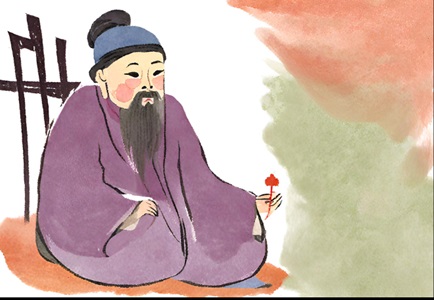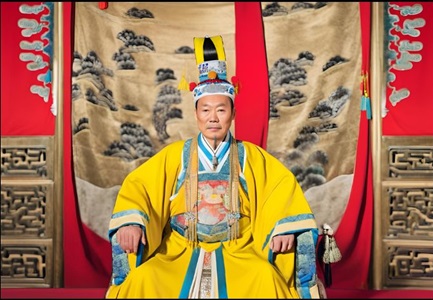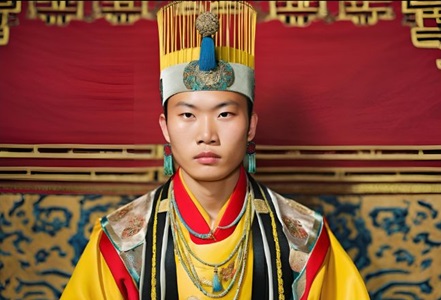Title of Biography in Chinese, Pinyin: 姜子牙传 (Jiāngziyá Zhuàn).
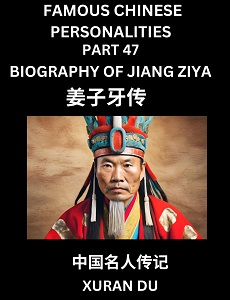
Title of Biography in English: The Biography of Jiang Ziya.
Check out books on my Amazon and Barnes & Noble homepages as well as the following pages to learn Biographies of famous Chinese personalities-
- Part 1 – Chinese Biography Book Series for Beginners
- Part 2 – Chinese Biography Book Series for Beginners
- Part 3 – Chinese Biography Book Series for Beginners
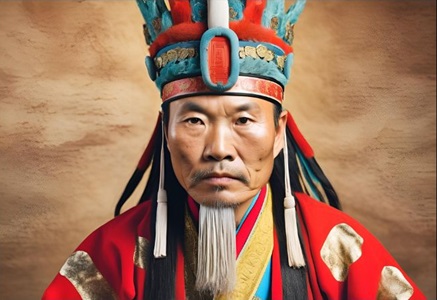
The Biography of Jiang Ziya in English (英文传记)
Jiang Ziya- A Notable Figure of the Shang Dynasty

Jiang Ziya, also known as Jiang Shang and respectfully addressed as Jiang Taigong, was a remarkable politician, strategist, and military figure during the late Shang and early Zhou dynasties. He played a pivotal role in assisting King Wu of Zhou in overthrowing the tyrannical Shang dynasty and establishing the Zhou dynasty.
Born into a noble family, Jiang Ziya displayed exceptional intelligence from a young age. He was well-versed in literature, history, astronomy, geography, and military strategy. Seeing the atrocities of the Shang dynasty and the plight of the common people, he vowed to aid a virtuous leader in overthrowing the tyranny. He met King Wu of Zhou and the two forged a strong bond of respect and admiration.
Under Jiang Ziya’s guidance, King Wu built up his forces and prepared for the campaign against the Shang. Jiang Ziya devised strategic plans, including forging alliances with neighboring tribes, winning over the hearts and minds of the people (安抚民心), and training the army. Ultimately, in the decisive Battle of Muye, the Zhou forces led by King Wu emerged victorious, overpowering the Shang army and leading to the self-immolation of King Zhou and the collapse of the Shang dynasty.

In recognition of his contributions, Jiang Ziya was awarded the title of Marquis of Qi and founded the Qi state, which later became one of the Five Hegemons during the Spring and Autumn period. His military treatise, known as the Taigong Bingfa, has exerted profound influence on Chinese military culture and remains a classic work in the field of military strategy.
Learn Biography Of Jiang Ziya in Chinese (中文传记)

姜子牙,名尚,字子牙,又称姜太公,为商末周初的杰出政治家、军事家、韬略家,同时也是中国历史上著名的谋士和兵法家。他辅佐周武王伐纣灭商,建立了周朝,为后世留下了宝贵的政治和军事遗产。
姜子牙出身于贵族家庭,自幼聪慧过人,饱读诗书,精通天文地理、兵法谋略。在商朝末年,他看到了纣王的暴政和百姓的疾苦,于是决心辅佐有德之人推翻暴政。他遇到了周武王,两人一见如故,武王对姜子牙的才华和智谋深为钦佩,于是请他出山相助。
在姜子牙的辅佐下,周武王积蓄力量,准备伐纣。姜子牙制定了一系列战略计划,包括联络诸侯、安抚民心、训练军队等。最终,在牧野之战中,周武王率领联军大败商军,纣王自焚身亡,商朝灭亡。姜子牙因功被封为齐侯,建立了齐国,成为春秋五霸之一。
姜子牙不仅在政治和军事上有着卓越的成就,他还创立了太公兵法,对后世的兵法产生了深远的影响。他的著作《六韬》被后世称为兵家经典,为中国的军事文化做出了巨大贡献。
Jiang Ziya Biography Keywords- English, Chinese & Pinyin (关键词)

- 姜子牙 (Jiāngziyá, Jiang Ziya): The legendary strategist and founder of the Qi state during the transition from the Shang to the Zhou dynasties.
- 姜太公 (Jiāng tàigōng, Jiang Taigong): An honorary title given to Jiang Ziya due to his wisdom and achievements.
- 周武王 (Zhōu wǔwáng, King Wu of Zhou): The king who Jiang Ziya advised and assisted in overthrowing the Shang dynasty.
- 牧野之战 (Mùyě zhī zhàn, Battle of Muye): The decisive battle in which the Zhou forces defeated the Shang army, leading to the end of the Shang dynasty.
- 太公兵法 (Tàigōng bīngfǎ, Taigong Bingfa): The military treatise attributed to Jiang Ziya, which has exerted profound influence on Chinese military culture.
Pinyin of Jiang Ziya Biography (姜子牙传记的拼音)

iāngziyá, míng shàng, zì zi yá, yòu chēng jiāng tàigōng, wèi shāng mò zhōu chū de jiéchū zhèngzhì jiā, jūnshì jiā, tāolüè jiā, tóngshí yěshì zhōngguó lìshǐ shàng zhùmíng de móushì hé bīngfǎ jiā. Tā fǔzuǒ zhōu wǔwáng fá zhòu miè shāng, jiànlìle zhōu cháo, wèi hòushì liú xiàle bǎoguì de zhèngzhì hé jūnshì yíchǎn.
Jiāngziyá chūshēn yú guìzú jiātíng, zì yòu cōnghuìguò rén, bǎo dú shī shū, jīngtōng tiānwén dìlǐ, bīngfǎ móulüè. Zài shāng cháo mònián, tā kàn dàole zhòu wáng de bàozhèng hé bǎixìng de jíkǔ, yúshì juéxīn fǔzuǒ yǒu dé zhī rén tuīfān bàozhèng. Tā yù dàole zhōu wǔwáng, liǎng rén yījiànrúgù, wǔwáng duì jiāngziyá de cáihuá hé zhìmóu shēn wéi qīnpèi, yúshì qǐng tā chūshān xiāngzhù.
Zài jiāngziyá de fǔzuǒ xià, zhōu wǔwáng jīxù lìliàng, zhǔnbèi fá zhòu. Jiāngziyá zhìdìngle yī xìliè zhànlüè jìhuà, bāokuò liánluò zhūhóu, ānfǔ mínxīn, xùnliàn jūnduì děng. Zuìzhōng, zài mùyě zhī zhàn zhōng, zhōu wǔwáng shuàilǐng liánjūn dà bài shāng jūn, zhòu wáng zìfén shēnwáng, shāng cháo mièwáng. Jiāngziyá yīn gōng bèi fēng wèi qí hóu, jiànlìle qí guó, chéngwéi chūnqiū wǔ bà zhī yī.

Jiāngziyá bùjǐn zài zhèngzhì hé jūnshì shàng yǒuzhe zhuóyuè de chéngjiù, tā hái chuànglìle tàigōng bīngfǎ, duì hòushì de bīngfǎ chǎnshēngle shēnyuǎn de yǐngxiǎng. Tā de zhùzuò “liù tāo” bèi hòushì chēng wèi bīngjiā jīngdiǎn, wéi zhōngguó de jūnshì wénhuà zuò chūle jùdà gòngxiàn.
